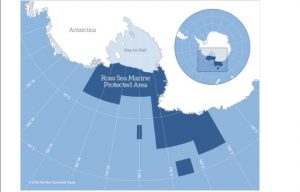. . SUSTAINABLE DEVELOPMENT . .
An article from Ecowatch
Today [October 28], the largest marine protected area in the world was created in the Ross Sea, off the coast of Antarctica. This is a huge victory for the whales, penguins and toothfish that live there and for the millions of people standing up to protect our oceans.

Source: New Zealand Ministry of Foreign Affairs and Trade
(Click on image to enlarge)
For years, Greenpeace has campaigned for protection of the Ross Sea at the Commission for the Conservation of Antarctic Marine Living Resources (CCAMLR), the international body responsible for stewardship of Antarctic waters. Each year, Greenpeace, the Antarctic Ocean Alliance and millions of people around the world would call on governments to do the right thing, each time thinking this was the year it would finally happen. But year after year, there was always something blocking progress. But this year, all of CCAMLR’s members finally agreed—it’s time to make the Ross Sea a protected sanctuary!
The Ross Sea sanctuary becomes the biggest marine protected area in the world, covering 1,550,000 km2 (which is roughly the size of three Texases, two Spains, or one Mongolia), almost three quarters of which will be a fully-protected.
Known as “the Last Ocean,” the Ross Sea has been identified by scientists as the most pristine shallow ocean left on Earth. It’s stunning, but we were starting to wonder if it would ever be protected…
To finally get agreement to protect the Ross Sea a time clause of 35 years was included, which means that in 35 years CCAMLR members will again need to decide on its future. Marine protection, to be truly effective, needs to be long lasting so we have all those years ahead of us to make sure when the Ross Sea sanctuary is up for renewal, there is no resistance to making it permanent. We’re pretty confident that by 2051 it will be a simple decision!
(Article continued in the right side of the page)
If we can connect up the planet through Internet, can’t we agree to preserve the planet?
(Article continued from the left side of the page)
This year has already been a huge year for ocean protection.
The Ross Sea win comes on the heels of President Obama’s decision to expand the Papahanaumokuakea National Marine Monument, making it—until now—the world’s largest marine protected area. Just days before that, Obama also made history by establishing the first National Marine Monument in the Atlantic, protecting canyons and seamounts.
Other nations have been stepping up too on protecting their national waters—such as Chile’s creation of a massive marine park around Easter Island and the UK’s commitment to create protected “Blue Belts” around its overseas territories.
As big as these new sanctuaries are, the ocean is bigger still. Despite a pledge at the World Conservation Congress this summer to protect 30 percent of our oceans by 2030 , we have a long way to go to meet that target—and Greenpeace is pushing for more, with a goal of setting aside 40 percent of our world’s oceans as fully-protected sanctuaries.
The science is clear that ocean sanctuaries are vital to protecting biodiversity, rebuilding fish populations and increasing resilience to climate change. Unfortunately, long battles like the one that led to this victory for the Ross Sea need more than just good science—they need millions of people speaking up for our oceans. Without your voices, the best scientific case in the world is not enough to stand up against the short-term interests of the powerful commercial fishing lobby.
The tide seems to be turning on marine conservation, but as the long battle to win protection for the Ross Sea shows, getting action in shared seas, beyond national jurisdiction is a massive challenge. That’s why we need to do more to protect the so-called High Seas, which at the moment not only have no protection, they don’t even have an agreed system that could protect them. But we are getting there! Greenpeace is working tirelessly to ensure that United Nations delivers sanctuaries on the high seas, as well as campaigning and mobilizing to protect some of our most precious shared seas like the Arctic. With your help, we want to do even more.
Thank you all for your part in this victory! Together, we can keep the momentum building and ensure that we’ll have healthy oceans long into the future. Let’s make this the decade of ocean protection!